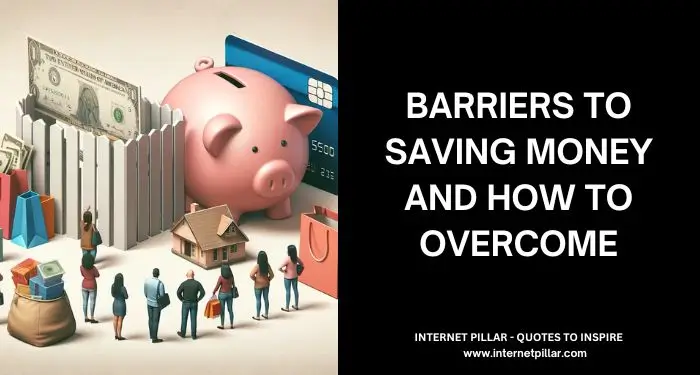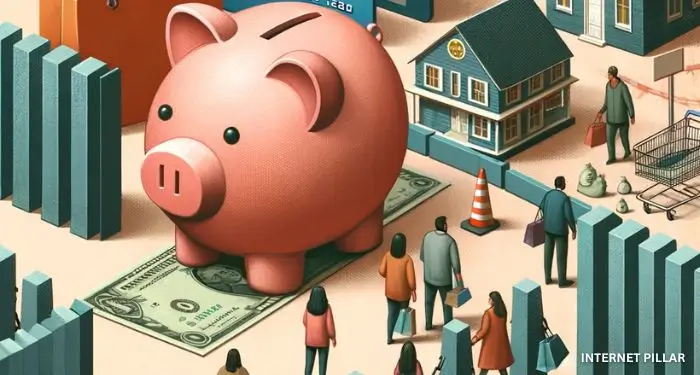Saving money is essential for financial stability and meeting life goals like retiring comfortably or handling emergencies.
It’s like flossing your teeth: we know we should do it but it’s often put off.
Many face barriers to saving from bad money habits to unexpected emergencies.
For instance a 2021 Federal Reserve survey found 35% of adults struggle to cover a $400 emergency expense without borrowing.
This makes saving for long-term goals like a house down payment or retirement seem tough.
Despite these challenges anyone can become good at saving. It’s about overcoming obstacles and consistently practicing good financial habits.

This article will try to answer common questions about saving identify the main barriers and provide strategies to overcome them.
Remember understanding these challenges is key to managing them better and successfully growing your savings.
15 Barriers To Saving Money and How to Overcome Them
1. Overusing Credit Cards
Credit cards are convenient but can lead to overspending. High interest rates add pressure to make full payments affecting your savings.

To manage this pay off purchases when they appear on your statement and avoid impulse buys.
Taking a day to think about a purchase can prevent unnecessary spending.
2. Not Having a Budget
Budgeting is crucial for financial goals. It guides your spending helping save money effectively.

Without a budget savings often take a backseat to spending.
To start try the 50/20/30 rule: 50% of income for needs 20% for savings and 30% for wants.
3. Trying to Impress Friends With Money
Spending to impress friends like splitting costly bills or buying luxury items can drain finances.

Instead opt for cost-effective activities like hikes or potlucks.
Stick to your budget especially for discretionary spending to manage these costs.
4. Lack of Self-Discipline
Self-discipline is key for saving requiring forgoing instant gratification.
Saving isn’t inherently enjoyable and demands prioritizing needs over wants.
People often struggle with self-discipline due to ingrained habits like retail therapy. Breaking these habits is challenging but essential for financial responsibility.
5. Not Knowing Where to Start
Beginning to save can be overwhelming especially if unfamiliar with the process.
The idea of committing to long-term savings or talking to a banker can be daunting.
Taking the first step to research and seek advice is vital to move past this barrier.
Courage to step out of your comfort zone is necessary to start saving effectively.
6. Lack of a Measurable Savings Goal
Many people save without a clear goal leading to ineffective saving habits.
Just like weight loss targets setting a specific savings goal each month can significantly enhance one’s ability to save effectively.
This approach keeps individuals accountable and allows for adjustments when necessary.
To improve one should set a monthly savings target evaluate their progress and consider automatic transfers from checking to savings accounts to ensure consistent savings.
7. Poor Debt Management
Struggling with debt management often leads to accumulating overwhelming debts with interest hindering the ability to save.

To tackle this issue the ‘avalanche’ method can be effective where debts are paid off one at a time starting with the highest interest rate.
Alternatively consolidating debts into one loan can simplify repayments though it may increase long-term interest costs.
8. Shopping Too Much
Excessive shopping even for daily necessities can impact savings. It’s not just about frequent purchases but also about not shopping strategically.
To save more one should make lists monitor prices over time and use coupons and cashback offers.
This approach not only saves money but can also make shopping a more enjoyable experience.
9. High Cost of Living
High living costs significantly impact the ability to save especially in areas with high food prices transportation costs and general expenses.
Factors like low income, high living costs relative to earnings and poor money management can exacerbate this issue.
In such environments saving becomes challenging especially during recessions or economic crises.
To counter this improving income enhancing money management skills or relocating to a more affordable area are potential solutions.
10. Lack of Purpose
Without a clear purpose or goal saving within a family can be directionless. Setting and visualizing financial goals can motivate and guide saving efforts.
Placing these goals in visible locations like an office wall car or as a phone screensaver can serve as daily reminders of the long-term benefits of these financial sacrifices.
11. Lack of Financial Knowledge
Not having enough financial knowledge can hinder your ability to save effectively.

Simply keeping money in a savings account may not be the best strategy.
Understanding how to invest and manage finances is crucial for a secure financial future.
Increase your financial literacy by consulting a financial advisor taking a course or using free online resources to learn about wealth management and growth.
12. Inflation in Housing and Education
Inflation characterized by high housing costs rising tuition and increasing interest rates makes saving challenging.
It affects both large expenses like home purchases and education as well as everyday costs like groceries.
Acknowledge the economy’s cyclical nature. America has endured economic downturns and inflation before.
Focus on controlling spending and aim to save at least 10% of your income for future goals.
13. Unforeseen Circumstances and Emergencies
Emergencies or unexpected events can drastically impact your savings.
They can quickly deplete existing savings and hinder your ability to save in the future.
These events demonstrate the importance of having a savings buffer.
Understand that while emergencies are not frequent they can have a significant financial impact.
The key is to consistently save to be prepared for both the best and worst scenarios.
14. Not Earning Enough Money
If your income is not sufficient to cover your expenses especially when they unexpectedly increase saving becomes difficult.

Budgeting helps you understand your spending patterns and identify any cost increases.
Consider options like a side hustle. This could be selling handmade jewelry, online working part-time in a café or driving for a ride-share service to supplement your income.
15. Student Loan Payments
Student loan payments are often a major expense with average monthly payments around $400 and median payments at $225. Your payments might be higher adding to the difficulty of saving.
Look into refinancing your student loans. This can reduce your monthly payments through lower interest rates or extended repayment terms freeing up more money for savings.
I hope you will be able to overcome these 15 barriers to save money and build a great future.



